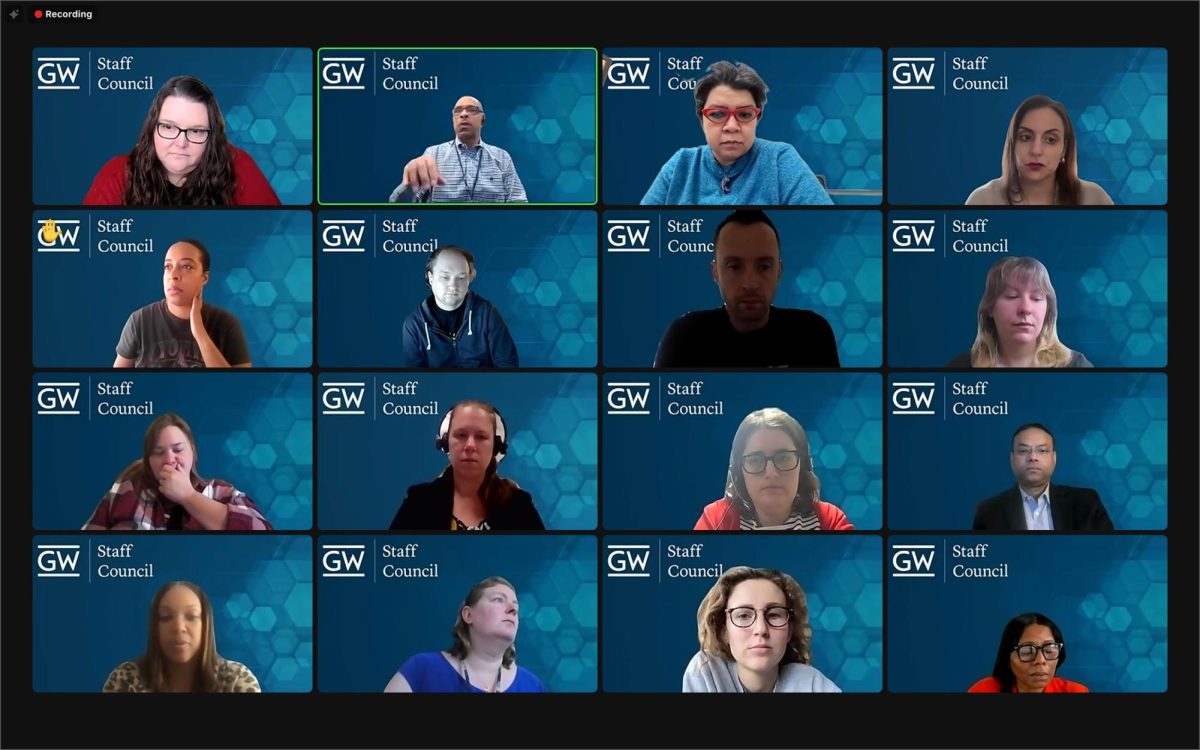Staff councilmembers voted to approve a resolution with minimal discussion that requests the University increase staff wages beginning in fiscal year 2025.
Emily Lewis, the head of the Compensation Subcommittee of the Staff Experience Committee, presented the resolution that requests all staff receive a one-time salary increase of 5 percent in FY 2025 and then annual wage increases between 3 and 5 percent that are not associated with performance ratings. Lewis said the resolution was spurred by a discussion on GW’s merit pay compensation model, which annually awards bonuses to staff who go beyond the duties outlined in their job descriptions.
GW pays staff both salary and hourly wages, depending on the position. The University compensates full-time service and support positions hourly, and positions in the manager stream are compensated on a salary basis.
Lewis said the merit pay model does not account for rising inflation rates and is not a fair analysis of staff performance because it doesn’t allow for an “honest review” of the employee’s competency. The resolution states that GW staff salaries and wages have failed to rise with the increasing cost of living in the D.C. area, with low budgets in several departments preventing the hiring of new staff or retention of current staff at a competitive rate.
Staff said in January that the merit pay system limits staff recognition due to small funds for performance-based bonuses and the subjectivity of the merit pay model.
“This came about from a big discussion of why we do the merit increases, the fact that the merit increases aren’t even keeping up with inflation, and also that the merit increases as they were set up don’t allow for an honest review of someone’s performance,” Lewis said.
Lewis said the subcommittee used data from more than 300 responses to Staff Council surveys to inform the resolution’s requests. The resolution states that more than 60 percent of staff who responded to a recent survey on merit and compensation practices at the University have reported taking on second jobs to “break even” because GW’s wages are too low to keep up with the District’s high cost of living.
Tricia Greenstein, the Libraries and Academic Innovation and GW Museums representative, said GW Libraries are seeing “immense” turnover in staff, which burdens current staff as they are expected to fill in for the vacant positions.
“The work, it’s going to go on the remaining staff and librarians,” Greenstein said. “That puts an impact on how they serve the missions of the student experience and research.”
Interim Vice President for Safety and Facilities Baxter Goodly and Vice President and Chief People Officer Sabrina Minor updated councilmembers on the University’s closure policy after councilmembers said staff were unclear on expectations for virtual work during GW’s cancellation of classes due to snowfall in January.
Goodly said the officials “didn’t get it right” when they canceled in-person classes on the first day of the spring semester after about four inches of snow blanketed the District. He said officials should have reassessed their choice in the morning after opting to cancel in-person classes the night before but failed to do so.
“We should have and could have reassessed in the morning and we did not, so we were caught off guard because we didn’t go back,” Goodly said. “We didn’t have a mechanism in place to reconvene and make sure that we had monitored and reassessed the situation.”
Goodly added that the University is revising its active shooter procedures and training — which he said he hopes will be ready by the fall semester — after a man charged with homicide escaped police custody at GW Hospital in September. He said officials are in the process of revising safety resources, and he is pushing to make annual University-wide trainings mandatory for faculty, staff and students to ensure all community members know how to respond in emergencies.
Faculty in September said unclear policies and inconsistent enforcement resulted in professors feeling unprepared to decide if students could leave classes or remain sheltered in place for the entire four-hour advisory.
Goodly said the University is aiming to release the training online during the fall semester.
“I am making a push to make it a mandatory training so that annually everyone gets refreshed on active shooter training,” Goodly said. “It should be for faculty, students and staff.”
He said the training will expand beyond active shooter training to include definitions that will help GW community members decipher if the campus emergency is a shelter-in-place or a lockdown. Officials released an “after-action review” of the September shelter-in-place order in December with plans to identify four protective actions — shelter, secure, lockdown and evacuation — to define emergencies to clarify officials’ guidance.
“We’re developing those trainings now and my hope is that we will have it sometime in fall, it will be up online,” Goodly said.
Councilmembers voted in Jacquelyne Pryor, the manager of the Biochemistry and Molecular Medicine Department, as the council’s School of Medicine and Health Science representative. Councilmembers also approved Madison Thurston, a senior academic and career coach, as the council’s representative of the Graduate School of Education and Human Development.





